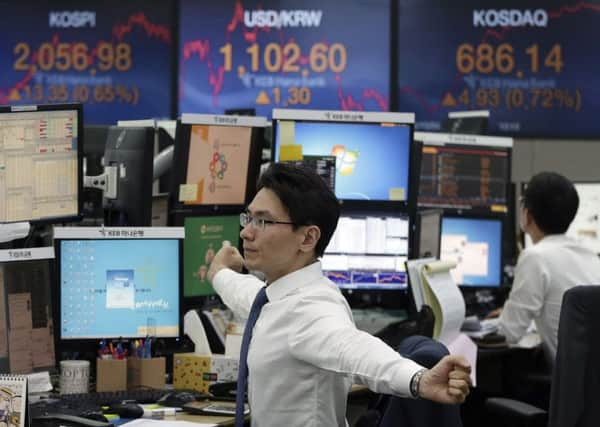Fears over '˜hard Brexit' push pound to 31-year low
This article contains affiliate links. We may earn a small commission on items purchased through this article, but that does not affect our editorial judgement.


But the surge came as the pound plunged to a new 31-year low against the dollar, as markets were spooked by fears of a “hard Brexit” after Prime Minister Theresa May had pledged to kick‑start the process by end‑March next year.
Chancellor Philip Hammond’s warning that the economy faced a “rollercoaster ride” over two years of Brexit negotiations also hit sentiment.
Advertisement
Hide AdAdvertisement
Hide AdThe pound fell 0.8 per cent against the greenback in afternoon trading to $1.27, its lowest level since 1985, while sterling was also down 0.7 per cent at €1.14 euros.
However, the pound’s dive was good for blue-chip stocks, as Footsie companies make about 80 per cent of their sales overseas and so benefit from the translation of earnings back into weaker sterling when profits are repatriated.
More than £23 billion was added to the Footsie as it jumped 1.3 per cent – or 90.82 points – to 7,074.34. That was close to the record close of 7,104 in April 2015.
At one stage the index touched 7,121.93, within a whisker of its record intraday high of 7,122.7 – struck in February 2015.
Richard Hunter, head of research at Wilson King Investment Management, said: “The FTSE 100 is purely currency‑driven at the moment.
“The constituent businesses get up to 80 per cent of their sales abroad so whenever you get weak sterling it immediately improves the quality of their earnings. If the pound weakens further this (surge) in shares may have further to run.”
The more UK-focused FTSE 250 index jumped 158.55 points to reach its highest-ever level of 18,342.07. Guy Foster, head of research at Brewin Dolphin, said the surge was “a reflection of the pound’s weakness to a large extent”.
He added: “The stock market is very international, with a high proportion of their revenues overseas. It makes their revenues worth more.”
Advertisement
Hide AdAdvertisement
Hide AdHowever, Foster said he believed equities were “due a pause for breath at the very least” after yesterday’s currency-induced leap.
The slide in the value of the pound is bad news for British holidaymakers whose pounds will buy less abroad, but is expected to give a continued fillip to inbound tourism into the UK as foreigners seek to capitalise on the weakness of the currency.
Prime Minister May played down the significance of volatility in sterling, telling the BBC: “If you stand back and look at the fundamentals of our economy, which are strong, if you look at the other economic data that has been around in recent weeks, if you look indeed at the most recent forecasts now coming out for growth in our economy this year, all of that is more positive than people had expected it to be and predicted it to be.”
